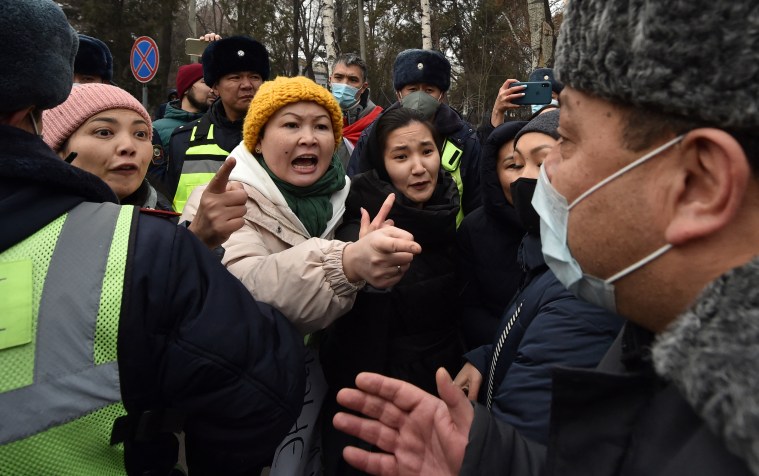Stockholm, October 25, 2023—Kyrgyzstan’s parliament should reject Russian-inspired legislation that would classify externally-funded media rights groups and nonprofits that run news outlets as “foreign representatives” and could force many nonprofits to close, the Committee to Protect Journalists said Wednesday.
On Wednesday, Kyrgyzstan’s parliament passed in a first reading a bill requiring nonprofits that receive foreign funding to register as “foreign representatives,” according to news reports.
Semetey Amanbekov, a member of local advocacy group Kyrgyzstan Media Platform, told CPJ by telephone that the main aim of the legislation is to stigmatize nonprofits as “untrustworthy foreign agents,” saying authorities could use it to target media rights organizations as well as nonprofits that run several of Kyrgyzstan’s prominent independent news websites.
The bill would require organizations to provide regular, detailed reports on their activities, including an audit of funds received from foreign sources and the use of those funds, the composition of their management, and the number of employees and their salaries. In addition, they would have to publish a report on their activities in the media every six months.
Local human rights group Bir Duino said the requirements were “excessively burdensome” and provided “a path to the destruction of civil society organizations,” and the U.S.-based news organization Eurasianet warned that the costs involved could prove “unsustainable” for smaller non-governmental organizations (NGO).
“Amid Kyrgyz authorities’ ongoing campaign to silence leading independent media, plans to copy Russia’s foreign agent legislation threaten to seriously hamper the work of press freedom groups and further restrict the country’s beleaguered free press,” said Gulnoza Said, CPJ’s Europe and Central Asia program coordinator, in New York. “Kyrgyzstan’s parliament must show that it still respects its international obligations to safeguard human rights and freedom of expression by rejecting any attempts to stigmatize nonprofits as foreign agents and criminalize their work.”
In addition, the bill introduces a fine or up to 5 years in prison for creating an NGO that “incites citizens to refuse to perform civil duties or to commit other illegal acts,” and a fine or up to 10 years in prison for “active participation” in or “propaganda” of such NGOs. In an October 13 statement calling on Kyrgyzstan’s parliament to reject the law, a spokesperson for the United Nations High Commissioner for Human Rights called this offense “ill-defined, broad and open to subjective interpretation” and said it could be used for “selective prosecution of legitimate human rights advocacy.”
Under the proposed law, state authorities would also have the right to request NGOs’ internal documents and to send government representatives to participate in NGOs’ internal activities, according to an analysis by the Washington, D.C.-headquartered International Center for Not-For-Profit Law.
On October 6, three United Nations special rapporteurs urged Kyrgyzstan to withdraw the bill as some provisions were contrary to the rights to freedom of association and freedom of expression, the right to non-discrimination, and the right to privacy. It said that proposals to give authorities the right to conduct unscheduled inspections could constitute “a tool of potential intimidation, surveillance, and harassment by authorities, which could be used against organizations that voice criticism or dissent.”
A similar “foreign agents” bill was submitted to parliament a decade ago but was rejected in its third reading in 2016 after facing opposition from civil society. In November 2022, a new version was presented, with the term foreign agent replaced with “foreign representative.” In May 2023, 33 lawmakers introduced the latest draft to parliament for discussion.
The bill defines nonprofits as “performing the function of a foreign representative” if they receive funding from foreign sources and participate in political activities, which it defines as “the organization and conduct of “political actions” aimed at influencing government policy or the “formation of public opinion”—a definition that the U.N. criticized as “overly vague”.
Organizations that fail to declare themselves as foreign representatives could have their activities and banking operations suspended for six months.
CPJ’s emails to Kyrgyzstan’s parliament and lawmaker Nadira Narmatova, who introduced the bill to parliament, did not receive any replies.
This year, authorities blocked and applied to shutter major independent outlets Kloop and Radio Azattyk, the local service of U.S. Congress-funded broadcaster Radio Free Europe/Radio Liberty, and in 2022 prominent Kyrgyzstan-born investigative journalist Bolot Temirov was deported in retaliation for his work.
In September, Kazakhstan published a register of organizations and individuals, including journalists and media outlets, receiving foreign funding without explicitly labeling them foreign agents.
In March, Georgia’s government withdrew a bill that would have labeled media outlets as foreign agents after public protests.
